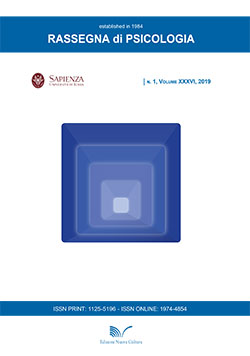Metacognitive style, attachment dimension and risk for alcohol abuse in Italian adolescents
DOI:
https://doi.org/10.13133/1974-4854/16702Keywords:
Binge Drinking, Attachment style, Metacognition.Abstract
Binge Drinking (BD) is a current phenomenon that has a strong health and economic impact worldwide, estimated 2.5 million cases of death in the population between 15 and 29 years. Previous studies highlighted the role of metacognition and insecure attachment in the development of psychopathological disorders. The study aims to verify if there is a correlation between the presence of metacognitive beliefs and an insecure attachment style with the risk for alcohol abuse. The sample is 206 students between 14-17 years. Each student completed the following questionnaires: The Metacognition Questionnaire - 30 (MCQ-30), Inventory of Parent Attachment (IPPA - Parent), Inventory of Peer Attachment (IPPA - Peer), Alcohol Use Disorders Identification Test (AUDIT - 10). The main result of the present study is that the “at risk for alcohol abuse” group shows a significant difference in the negative beliefs about uncontrollability and danger subscale (MCQ – 30), the Parent Trust, the Parent Communication and the Parent Alienation subscales (IPPA – Parent) compared to “not at risk for alcohol abuse” group. This result highlights that adolescents with a metacognitive style based on negative metacognitions may be more likely to develop BD. Furthermore, a correlation between the alcohol abuse risk and an insecure attachment style towards parents emerges. The present study suggests the need for interventions focused on metacognition or family interventions focused on communication in adolescents at risk.Downloads
Published
2019-04-11
Issue
Section
Articles
License
Copyright (c) 2019 Carlo Lai, Laura Pierro, Edvaldo Begotaraj, Alessia Marani, Daniela Sambucini, Gaia Romana Pellicano

This work is licensed under a Creative Commons Attribution 4.0 International License.

